Word Feasts
Poetry has often been described as “food for the soul,” and these ethnic poetry dinners in community settings have proven an effective means for presenting folk arts both to the communities that nurtured them and to the general public. The Poetry Dinners grew out of the People’s Poetry Gathering and its efforts to identify and support not only national and international poetry traditions, but also the diverse ethnic poetry communities of New York City. They also built on another longstanding interest of the Gathering to research, document, and present informal poetry duels and contests. In addition, the Gathering and our proposed poetry dinners have a special interest in developing increasingly better ways to translate poetry across languages. We have experimented with different formats for translating poetry presentations into English, often achieving the best results when bilingual poets translate their own work, and when translators and poets rehearse together. When poetry is accompanied by music, for instance, we have rehearsed ways for the music to continue beneath the translations, helping to create a seamless, accessible performance.We are continually struck by the passion of foreign language poets to find ways to convey their art to English speaking audiences and vice versa.
Selected Poetry Dinners
Mohawk Dinner (2008)
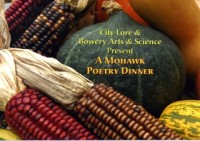
City Lore presented a Mohawk Poetry Dinner on December 12, 2008 the Bowery Poetry Club, highlighting Theresa “Bear” Fox and other members the singing group Kontiwenenhawi from the Akwesasne Reservation in upstate New York. We also featured the poetry of a Native American poet from upstate New York, James Thomas Stevens. The Mohawk dinner was part of our initiative to highlight poetry from the world’s endangered languages. James Stevens also read from his volume Mohawk/Samoa: Transmigrations, which highlights the theme of poetry across languages.
Trinidadian Calypso: The Sung Poetry of the Trinidad Carnival (2007)
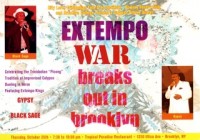
According to legend, calypso was introduced in Trinidad in the late 18th century, when French colonizers asked their most talented slaves to entertain them in song. The songs were originally sung in French and Creole, but with British colonial rule Trinidadian English became the language of calypso. Calypso has developed its own brand of sung insults, often sung to what was called a relatively constant picong melody. The event took place on October 25, 2007 and highlighted these Trinidadian extempo or picong traditions of improvised poetry at the Tropical Paradise Restaurant, in the heart of Brooklyn’s West Indian community. We featured one of the great masters of the picong tradition of verbal dueling and musical repartee Black Sage (Phillip Murray) as well as a newcomer to the tradition, Linden “Fat Man” George, and venerable calypsonian Sugar Aloes (Michael Anthony Osuna). Their skills at this traditional art form where teasing, heckling, and ritual insult are set to a Calypso beat were on full display.
African Poetry Dinner in Harlem (2006)
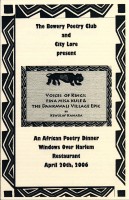
In 1998, during the recent civil war in Sierra Leone, a fire destroyed the only written copy of a village’s epic poem. In 2002, City Lore commissioned finah poet and John Jay College professor Kewulay Kamara to return to his village and recreate the ancient story in song for the People’s Poetry Gathering. Voices of Kings interwove Kamara’s own boyhood story of watching his father set down the epic with the epic itself, a creation myth that traces the origin of the finah clan of Islamic warrior poets. Along the way, Kamara told of a young boy who grew from the precolonial past to a post-colonial English-speaking and American future. This epic retelling fused the history of slavery, colonialism, West Africa, and the savage Civil War in Sierra Leone, all appearing in this sweeping poetry history, which also described how reconstructing the ancient stories may hold a key to a better future for the continent. This April 20, 2006 performance featured some of the finest African jali musicians in New York.
Poemas, Pasteles e Parandas:
A Puerto Rican Holiday Dinner with Music and Poetry (2005)
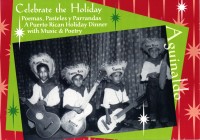
During La Navidad, the Christmas season in Puerto Rico, which lasts from December through mid-January, strolling groups of musicians called parrandas or asaltos go door to door playing and singing the carols known as aguinaldos. This dinner, hosted by Bobby Sanabria, was a celebration of music, poetry, and traditional Puerto Rican holiday food and drink featuring Eddie Rosa and Renacer Trovero, Danza Fiesta, and Tato Laviera. It took place at the Bowery Poetry Club on December 18, 2005.
Aysh wa Milh: An Evening of Yemeni Music and Poetry (2004)
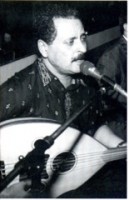
On May 16, 2004 at Tripoli Restaurant Yemeni traditions of reciting, composing and improvising poetry were on show in Brooklyn. In Yemen, sung poems accompany most work activity. Poetry also plays a role in mediating disputes – in some cases serving as an alternative to war. Yemeni tribesmen perform three genres of poems: the improvised bālah performances in which one person begins by reciting a two line poem which is repeated in chorus; then another person composes a poetic response, trying to improve on the first; the pithy zamil poems which are partly improvised but place an emphasis on the final text; and the qasīdah longer poems by master poets, often distributed to the community on cassette tapes. Local artists like Mohammed Hayel shared these forms with New York audiences.
The Mushaira: South Asian Poetry and Music (2004)
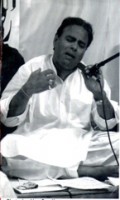
On May 8, 2004, an audience of more than 100–more than half from India and Pakistan–attended a traditional mushaira, a literary gathering where the audiences participate by repeating refrains of poems in this pan-South Asian tradition. At the informal mushaira at Shaheen’s Sweets restaurant in Jackson Heights, poets sat in a semi-circle on a carpeted stage, with an oil lamp to signal each poet’s turn to read. The poets performed original ghazal poems — lyric, sometimes sung, verses consisting of thematically autonomous couplets unified by rhyme and meter. At this evening’s magical event, the poets submitted their poems a month in advance; their work was translated by one of the poets, Randhir Singh, and a poetic free-verse translation was done based on the English translations by Bob Holman. At the event the poets read their pieces in Urdu and Punjabi, and both English translations were performed. As is the tradition, the audience chanted “Wa Wa” after lines they enjoyed and the poet repeated the lines in a call-and-response style — for the English versions as well! Finally, traditional singer Master Niaz, who had also received the poems in advance, sang the lyrics, accompanied by musicians playing tabla drums, harmonium, and the bulbul tarang.
Dinner with Rumi (2004)
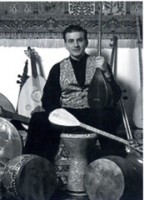
In the neighborhoods of New York City, many Iranian immigrants carry poetry notebooks with them at all times. Evenings of Persian poetry called shab-e-sher’s take place throughout the year in homes and restaurants. Poems are recited, a meal is eaten, and traditional musicians perform, often singing the poetry of Rumi. Mowlana Jalaluddin Rumi who is one of the great spiritual masters and founder of the Mawlawi Sufi order, a leading mystical brotherhood of Islam. Born in Balkh in the north-eastern provinces of Persia (present day Afghanistan) in 1207 to a family of learned theologians, he was introduced into the mystical path by a wandering dervish, Shamsuddin of Tabriz. He died on December 17, 1273. That night was named Sebul Arus (Night of Union), and, ever since, the Mawlawi dervishes have kept that date as a festival to celebrate this master poet. Persian classical musician Amir Vahab hosted an evening of poetry honoring this tradition on May 15, 2005.



